Canada's Sugary Drink Tax: A Bittersweet Tale
VerifiedAdded on 2023/06/03
|6
|1514
|225
AI Summary
The consumption of sugary drinks in Canada has been linked to rising rates of obesity and metabolic disorders. While some advocate for a tax on sugary drinks to combat this issue, others argue it will have little impact and negatively affect families living in poverty. This article explores the issue and proposes additional policy frameworks to combat obesity.
Contribute Materials
Your contribution can guide someone’s learning journey. Share your
documents today.
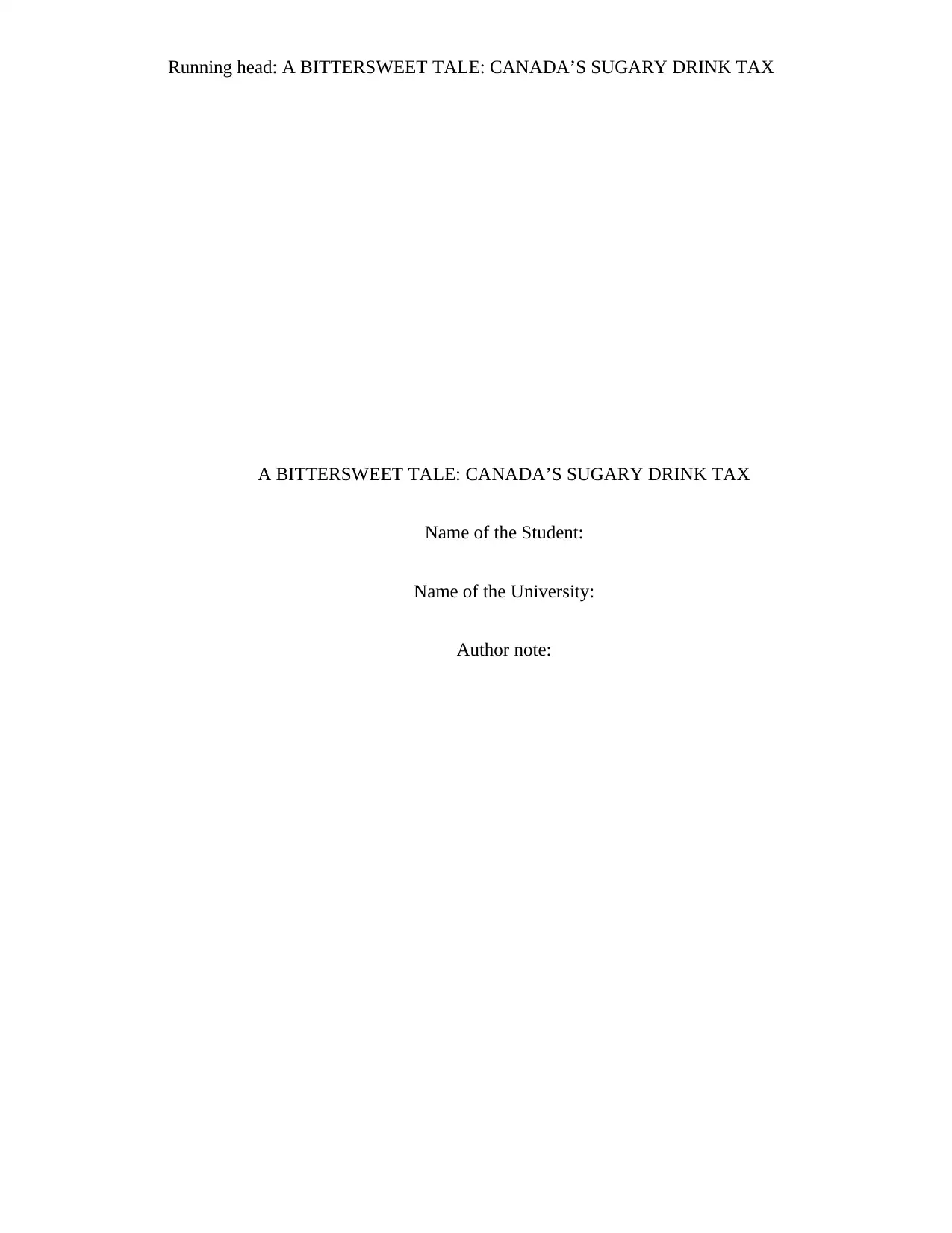
Running head: A BITTERSWEET TALE: CANADA’S SUGARY DRINK TAX
A BITTERSWEET TALE: CANADA’S SUGARY DRINK TAX
Name of the Student:
Name of the University:
Author note:
A BITTERSWEET TALE: CANADA’S SUGARY DRINK TAX
Name of the Student:
Name of the University:
Author note:
Secure Best Marks with AI Grader
Need help grading? Try our AI Grader for instant feedback on your assignments.
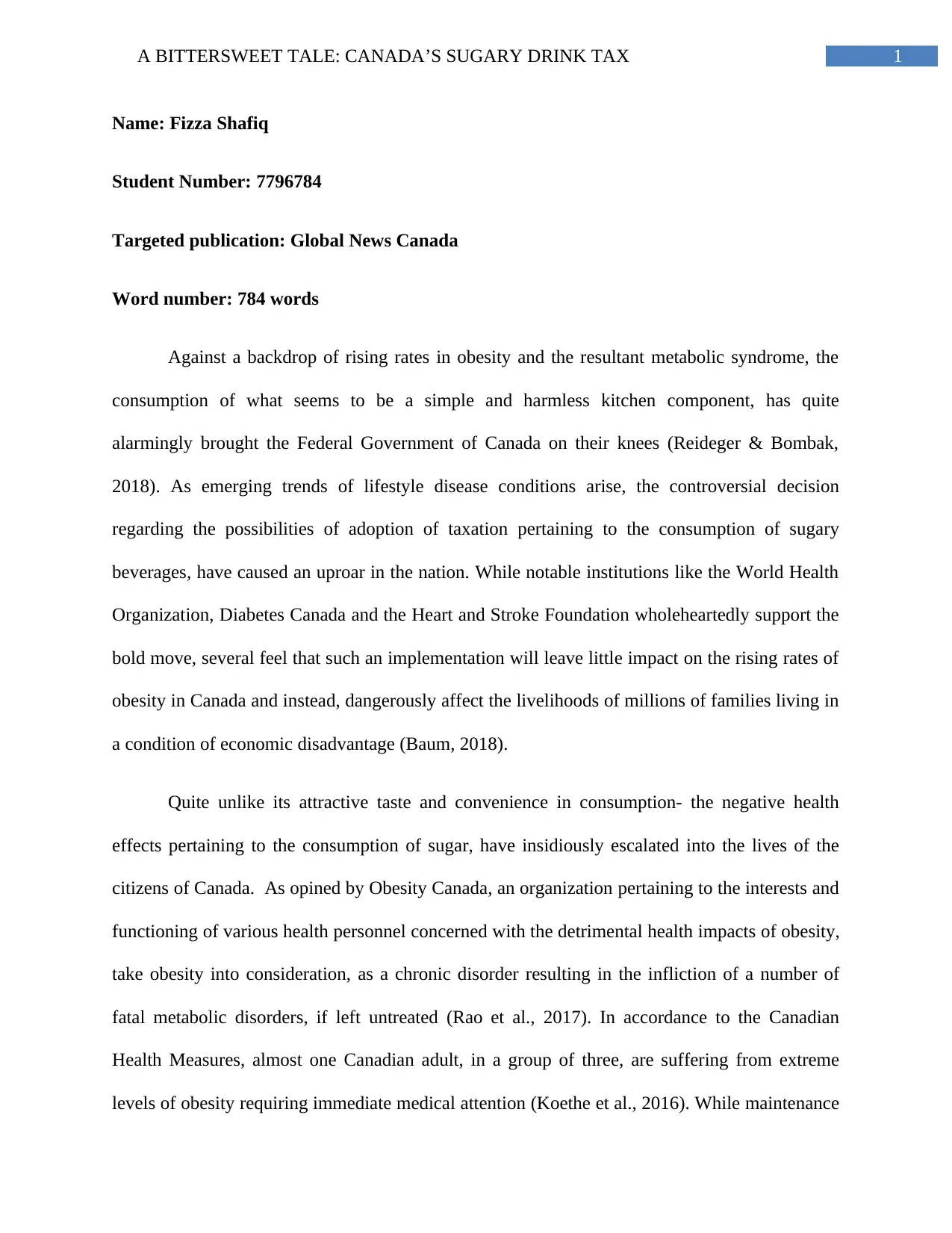
1A BITTERSWEET TALE: CANADA’S SUGARY DRINK TAX
Name: Fizza Shafiq
Student Number: 7796784
Targeted publication: Global News Canada
Word number: 784 words
Against a backdrop of rising rates in obesity and the resultant metabolic syndrome, the
consumption of what seems to be a simple and harmless kitchen component, has quite
alarmingly brought the Federal Government of Canada on their knees (Reideger & Bombak,
2018). As emerging trends of lifestyle disease conditions arise, the controversial decision
regarding the possibilities of adoption of taxation pertaining to the consumption of sugary
beverages, have caused an uproar in the nation. While notable institutions like the World Health
Organization, Diabetes Canada and the Heart and Stroke Foundation wholeheartedly support the
bold move, several feel that such an implementation will leave little impact on the rising rates of
obesity in Canada and instead, dangerously affect the livelihoods of millions of families living in
a condition of economic disadvantage (Baum, 2018).
Quite unlike its attractive taste and convenience in consumption- the negative health
effects pertaining to the consumption of sugar, have insidiously escalated into the lives of the
citizens of Canada. As opined by Obesity Canada, an organization pertaining to the interests and
functioning of various health personnel concerned with the detrimental health impacts of obesity,
take obesity into consideration, as a chronic disorder resulting in the infliction of a number of
fatal metabolic disorders, if left untreated (Rao et al., 2017). In accordance to the Canadian
Health Measures, almost one Canadian adult, in a group of three, are suffering from extreme
levels of obesity requiring immediate medical attention (Koethe et al., 2016). While maintenance
Name: Fizza Shafiq
Student Number: 7796784
Targeted publication: Global News Canada
Word number: 784 words
Against a backdrop of rising rates in obesity and the resultant metabolic syndrome, the
consumption of what seems to be a simple and harmless kitchen component, has quite
alarmingly brought the Federal Government of Canada on their knees (Reideger & Bombak,
2018). As emerging trends of lifestyle disease conditions arise, the controversial decision
regarding the possibilities of adoption of taxation pertaining to the consumption of sugary
beverages, have caused an uproar in the nation. While notable institutions like the World Health
Organization, Diabetes Canada and the Heart and Stroke Foundation wholeheartedly support the
bold move, several feel that such an implementation will leave little impact on the rising rates of
obesity in Canada and instead, dangerously affect the livelihoods of millions of families living in
a condition of economic disadvantage (Baum, 2018).
Quite unlike its attractive taste and convenience in consumption- the negative health
effects pertaining to the consumption of sugar, have insidiously escalated into the lives of the
citizens of Canada. As opined by Obesity Canada, an organization pertaining to the interests and
functioning of various health personnel concerned with the detrimental health impacts of obesity,
take obesity into consideration, as a chronic disorder resulting in the infliction of a number of
fatal metabolic disorders, if left untreated (Rao et al., 2017). In accordance to the Canadian
Health Measures, almost one Canadian adult, in a group of three, are suffering from extreme
levels of obesity requiring immediate medical attention (Koethe et al., 2016). While maintenance
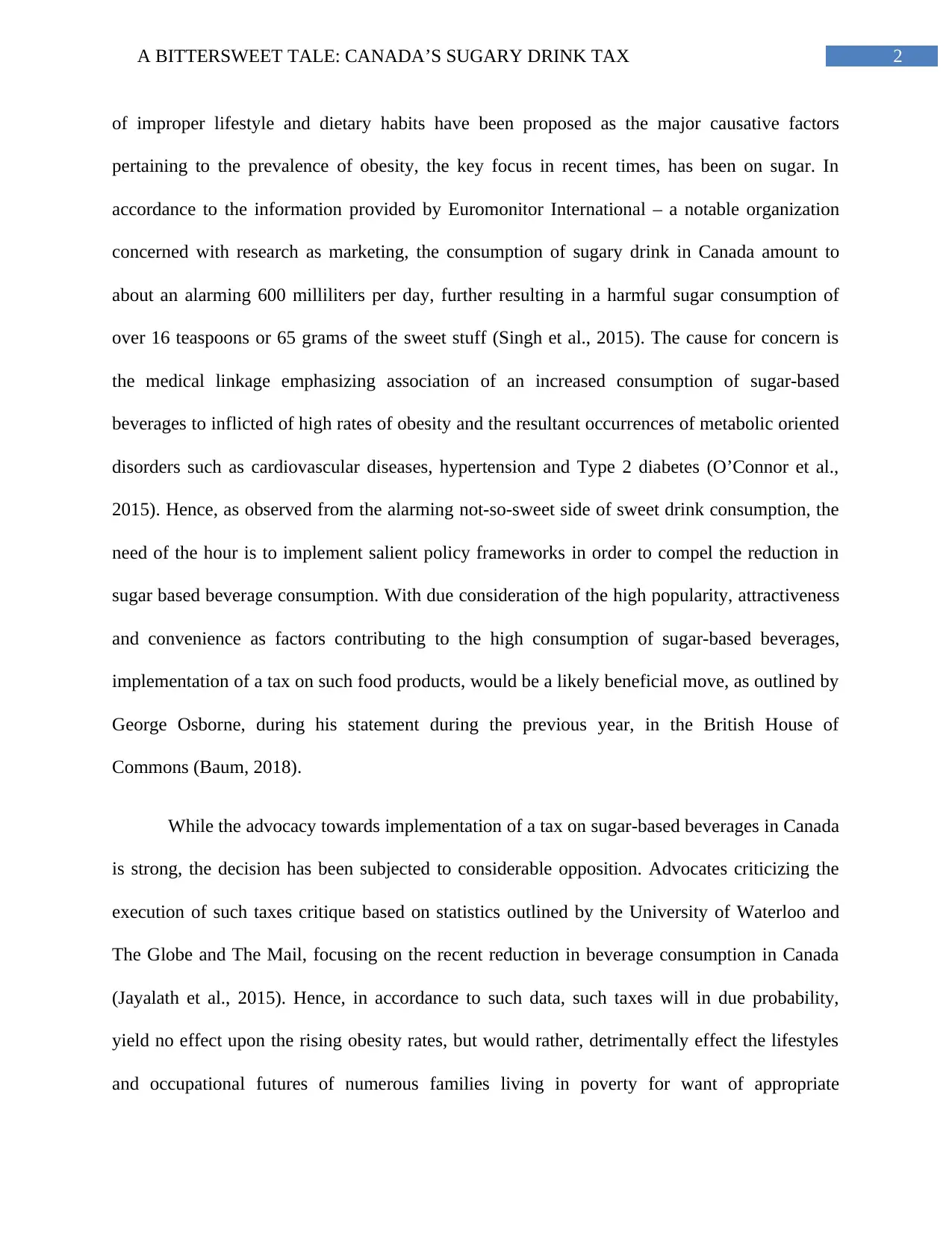
2A BITTERSWEET TALE: CANADA’S SUGARY DRINK TAX
of improper lifestyle and dietary habits have been proposed as the major causative factors
pertaining to the prevalence of obesity, the key focus in recent times, has been on sugar. In
accordance to the information provided by Euromonitor International – a notable organization
concerned with research as marketing, the consumption of sugary drink in Canada amount to
about an alarming 600 milliliters per day, further resulting in a harmful sugar consumption of
over 16 teaspoons or 65 grams of the sweet stuff (Singh et al., 2015). The cause for concern is
the medical linkage emphasizing association of an increased consumption of sugar-based
beverages to inflicted of high rates of obesity and the resultant occurrences of metabolic oriented
disorders such as cardiovascular diseases, hypertension and Type 2 diabetes (O’Connor et al.,
2015). Hence, as observed from the alarming not-so-sweet side of sweet drink consumption, the
need of the hour is to implement salient policy frameworks in order to compel the reduction in
sugar based beverage consumption. With due consideration of the high popularity, attractiveness
and convenience as factors contributing to the high consumption of sugar-based beverages,
implementation of a tax on such food products, would be a likely beneficial move, as outlined by
George Osborne, during his statement during the previous year, in the British House of
Commons (Baum, 2018).
While the advocacy towards implementation of a tax on sugar-based beverages in Canada
is strong, the decision has been subjected to considerable opposition. Advocates criticizing the
execution of such taxes critique based on statistics outlined by the University of Waterloo and
The Globe and The Mail, focusing on the recent reduction in beverage consumption in Canada
(Jayalath et al., 2015). Hence, in accordance to such data, such taxes will in due probability,
yield no effect upon the rising obesity rates, but would rather, detrimentally effect the lifestyles
and occupational futures of numerous families living in poverty for want of appropriate
of improper lifestyle and dietary habits have been proposed as the major causative factors
pertaining to the prevalence of obesity, the key focus in recent times, has been on sugar. In
accordance to the information provided by Euromonitor International – a notable organization
concerned with research as marketing, the consumption of sugary drink in Canada amount to
about an alarming 600 milliliters per day, further resulting in a harmful sugar consumption of
over 16 teaspoons or 65 grams of the sweet stuff (Singh et al., 2015). The cause for concern is
the medical linkage emphasizing association of an increased consumption of sugar-based
beverages to inflicted of high rates of obesity and the resultant occurrences of metabolic oriented
disorders such as cardiovascular diseases, hypertension and Type 2 diabetes (O’Connor et al.,
2015). Hence, as observed from the alarming not-so-sweet side of sweet drink consumption, the
need of the hour is to implement salient policy frameworks in order to compel the reduction in
sugar based beverage consumption. With due consideration of the high popularity, attractiveness
and convenience as factors contributing to the high consumption of sugar-based beverages,
implementation of a tax on such food products, would be a likely beneficial move, as outlined by
George Osborne, during his statement during the previous year, in the British House of
Commons (Baum, 2018).
While the advocacy towards implementation of a tax on sugar-based beverages in Canada
is strong, the decision has been subjected to considerable opposition. Advocates criticizing the
execution of such taxes critique based on statistics outlined by the University of Waterloo and
The Globe and The Mail, focusing on the recent reduction in beverage consumption in Canada
(Jayalath et al., 2015). Hence, in accordance to such data, such taxes will in due probability,
yield no effect upon the rising obesity rates, but would rather, detrimentally effect the lifestyles
and occupational futures of numerous families living in poverty for want of appropriate
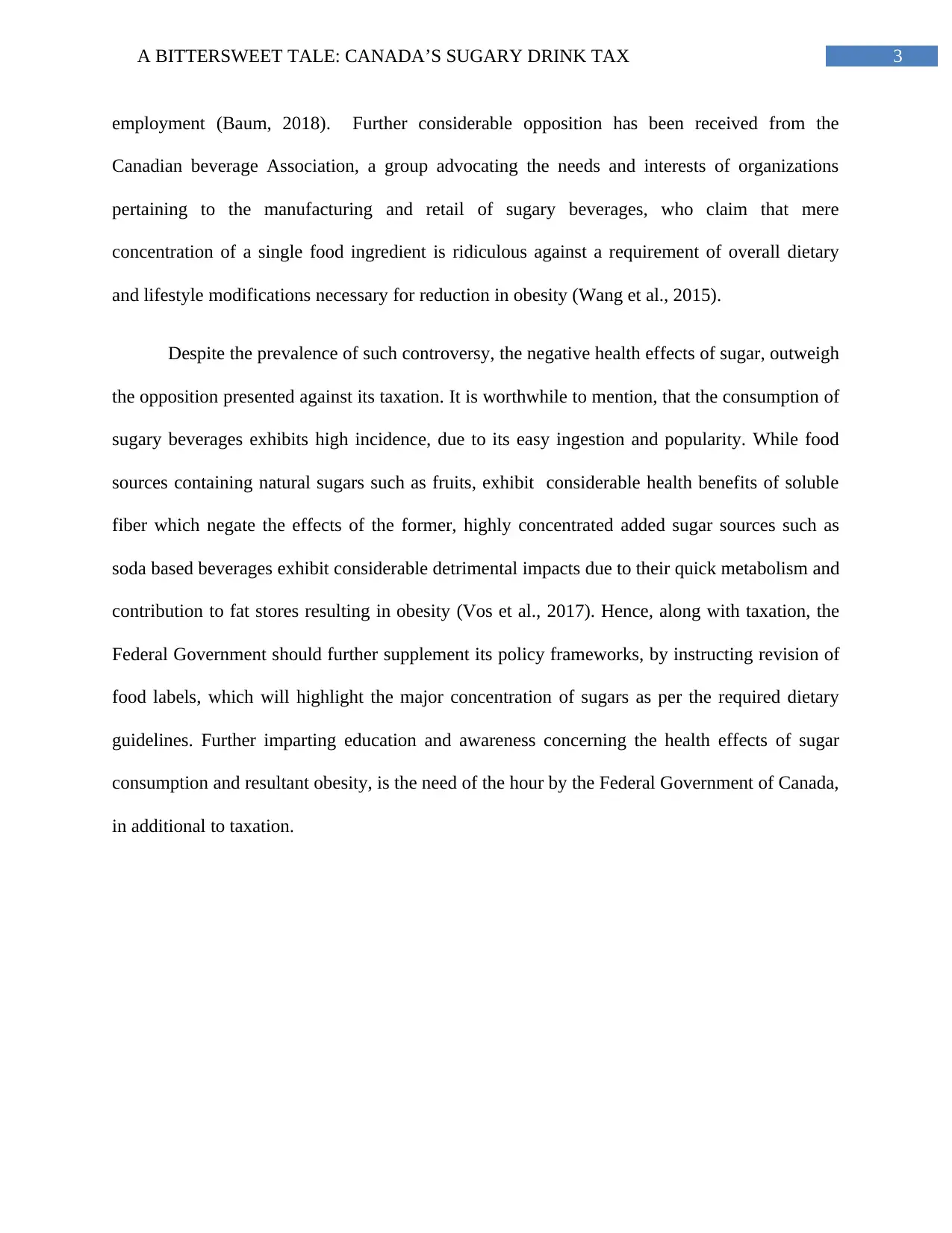
3A BITTERSWEET TALE: CANADA’S SUGARY DRINK TAX
employment (Baum, 2018). Further considerable opposition has been received from the
Canadian beverage Association, a group advocating the needs and interests of organizations
pertaining to the manufacturing and retail of sugary beverages, who claim that mere
concentration of a single food ingredient is ridiculous against a requirement of overall dietary
and lifestyle modifications necessary for reduction in obesity (Wang et al., 2015).
Despite the prevalence of such controversy, the negative health effects of sugar, outweigh
the opposition presented against its taxation. It is worthwhile to mention, that the consumption of
sugary beverages exhibits high incidence, due to its easy ingestion and popularity. While food
sources containing natural sugars such as fruits, exhibit considerable health benefits of soluble
fiber which negate the effects of the former, highly concentrated added sugar sources such as
soda based beverages exhibit considerable detrimental impacts due to their quick metabolism and
contribution to fat stores resulting in obesity (Vos et al., 2017). Hence, along with taxation, the
Federal Government should further supplement its policy frameworks, by instructing revision of
food labels, which will highlight the major concentration of sugars as per the required dietary
guidelines. Further imparting education and awareness concerning the health effects of sugar
consumption and resultant obesity, is the need of the hour by the Federal Government of Canada,
in additional to taxation.
employment (Baum, 2018). Further considerable opposition has been received from the
Canadian beverage Association, a group advocating the needs and interests of organizations
pertaining to the manufacturing and retail of sugary beverages, who claim that mere
concentration of a single food ingredient is ridiculous against a requirement of overall dietary
and lifestyle modifications necessary for reduction in obesity (Wang et al., 2015).
Despite the prevalence of such controversy, the negative health effects of sugar, outweigh
the opposition presented against its taxation. It is worthwhile to mention, that the consumption of
sugary beverages exhibits high incidence, due to its easy ingestion and popularity. While food
sources containing natural sugars such as fruits, exhibit considerable health benefits of soluble
fiber which negate the effects of the former, highly concentrated added sugar sources such as
soda based beverages exhibit considerable detrimental impacts due to their quick metabolism and
contribution to fat stores resulting in obesity (Vos et al., 2017). Hence, along with taxation, the
Federal Government should further supplement its policy frameworks, by instructing revision of
food labels, which will highlight the major concentration of sugars as per the required dietary
guidelines. Further imparting education and awareness concerning the health effects of sugar
consumption and resultant obesity, is the need of the hour by the Federal Government of Canada,
in additional to taxation.
Secure Best Marks with AI Grader
Need help grading? Try our AI Grader for instant feedback on your assignments.
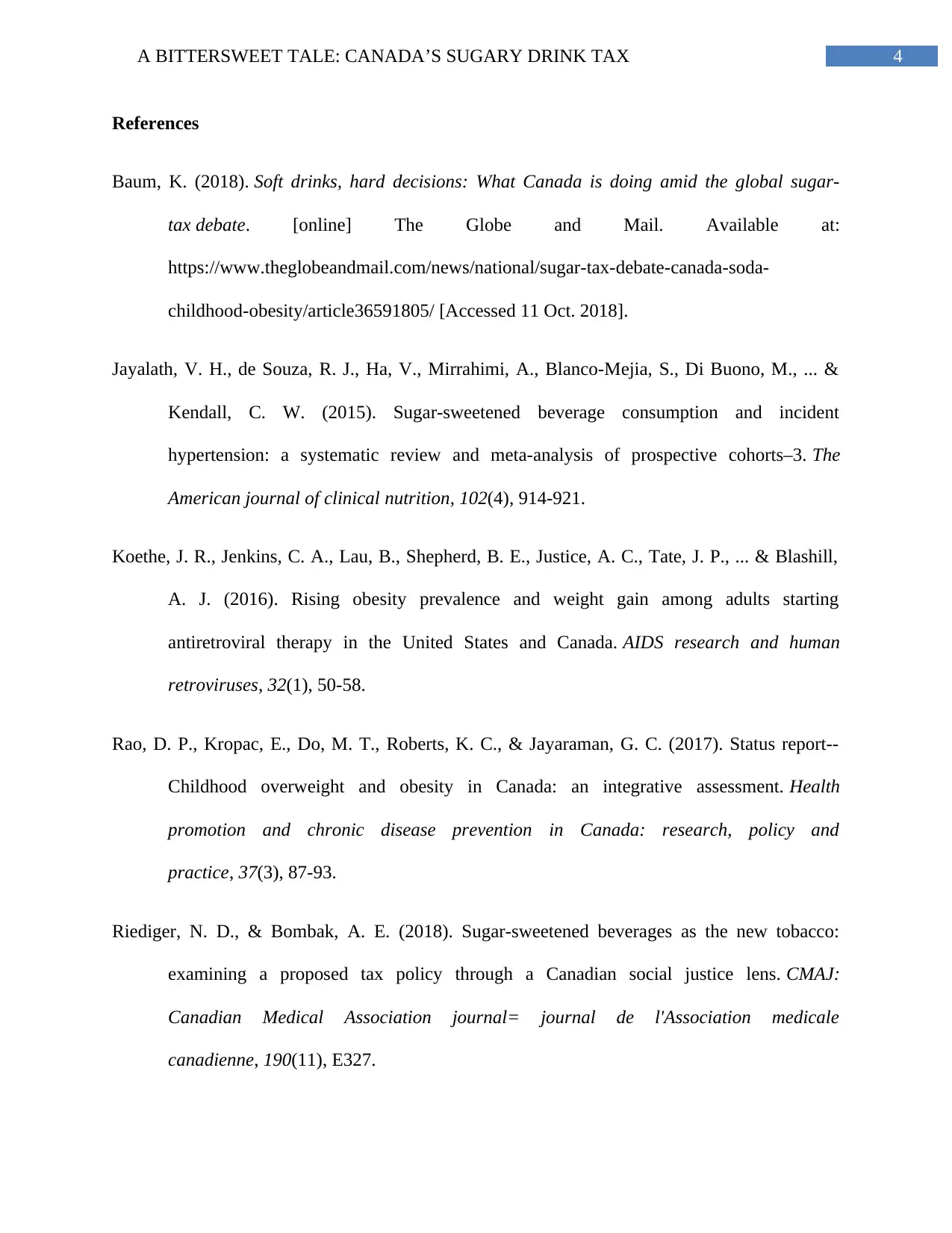
4A BITTERSWEET TALE: CANADA’S SUGARY DRINK TAX
References
Baum, K. (2018). Soft drinks, hard decisions: What Canada is doing amid the global sugar-
tax debate. [online] The Globe and Mail. Available at:
https://www.theglobeandmail.com/news/national/sugar-tax-debate-canada-soda-
childhood-obesity/article36591805/ [Accessed 11 Oct. 2018].
Jayalath, V. H., de Souza, R. J., Ha, V., Mirrahimi, A., Blanco-Mejia, S., Di Buono, M., ... &
Kendall, C. W. (2015). Sugar-sweetened beverage consumption and incident
hypertension: a systematic review and meta-analysis of prospective cohorts–3. The
American journal of clinical nutrition, 102(4), 914-921.
Koethe, J. R., Jenkins, C. A., Lau, B., Shepherd, B. E., Justice, A. C., Tate, J. P., ... & Blashill,
A. J. (2016). Rising obesity prevalence and weight gain among adults starting
antiretroviral therapy in the United States and Canada. AIDS research and human
retroviruses, 32(1), 50-58.
Rao, D. P., Kropac, E., Do, M. T., Roberts, K. C., & Jayaraman, G. C. (2017). Status report--
Childhood overweight and obesity in Canada: an integrative assessment. Health
promotion and chronic disease prevention in Canada: research, policy and
practice, 37(3), 87-93.
Riediger, N. D., & Bombak, A. E. (2018). Sugar-sweetened beverages as the new tobacco:
examining a proposed tax policy through a Canadian social justice lens. CMAJ:
Canadian Medical Association journal= journal de l'Association medicale
canadienne, 190(11), E327.
References
Baum, K. (2018). Soft drinks, hard decisions: What Canada is doing amid the global sugar-
tax debate. [online] The Globe and Mail. Available at:
https://www.theglobeandmail.com/news/national/sugar-tax-debate-canada-soda-
childhood-obesity/article36591805/ [Accessed 11 Oct. 2018].
Jayalath, V. H., de Souza, R. J., Ha, V., Mirrahimi, A., Blanco-Mejia, S., Di Buono, M., ... &
Kendall, C. W. (2015). Sugar-sweetened beverage consumption and incident
hypertension: a systematic review and meta-analysis of prospective cohorts–3. The
American journal of clinical nutrition, 102(4), 914-921.
Koethe, J. R., Jenkins, C. A., Lau, B., Shepherd, B. E., Justice, A. C., Tate, J. P., ... & Blashill,
A. J. (2016). Rising obesity prevalence and weight gain among adults starting
antiretroviral therapy in the United States and Canada. AIDS research and human
retroviruses, 32(1), 50-58.
Rao, D. P., Kropac, E., Do, M. T., Roberts, K. C., & Jayaraman, G. C. (2017). Status report--
Childhood overweight and obesity in Canada: an integrative assessment. Health
promotion and chronic disease prevention in Canada: research, policy and
practice, 37(3), 87-93.
Riediger, N. D., & Bombak, A. E. (2018). Sugar-sweetened beverages as the new tobacco:
examining a proposed tax policy through a Canadian social justice lens. CMAJ:
Canadian Medical Association journal= journal de l'Association medicale
canadienne, 190(11), E327.
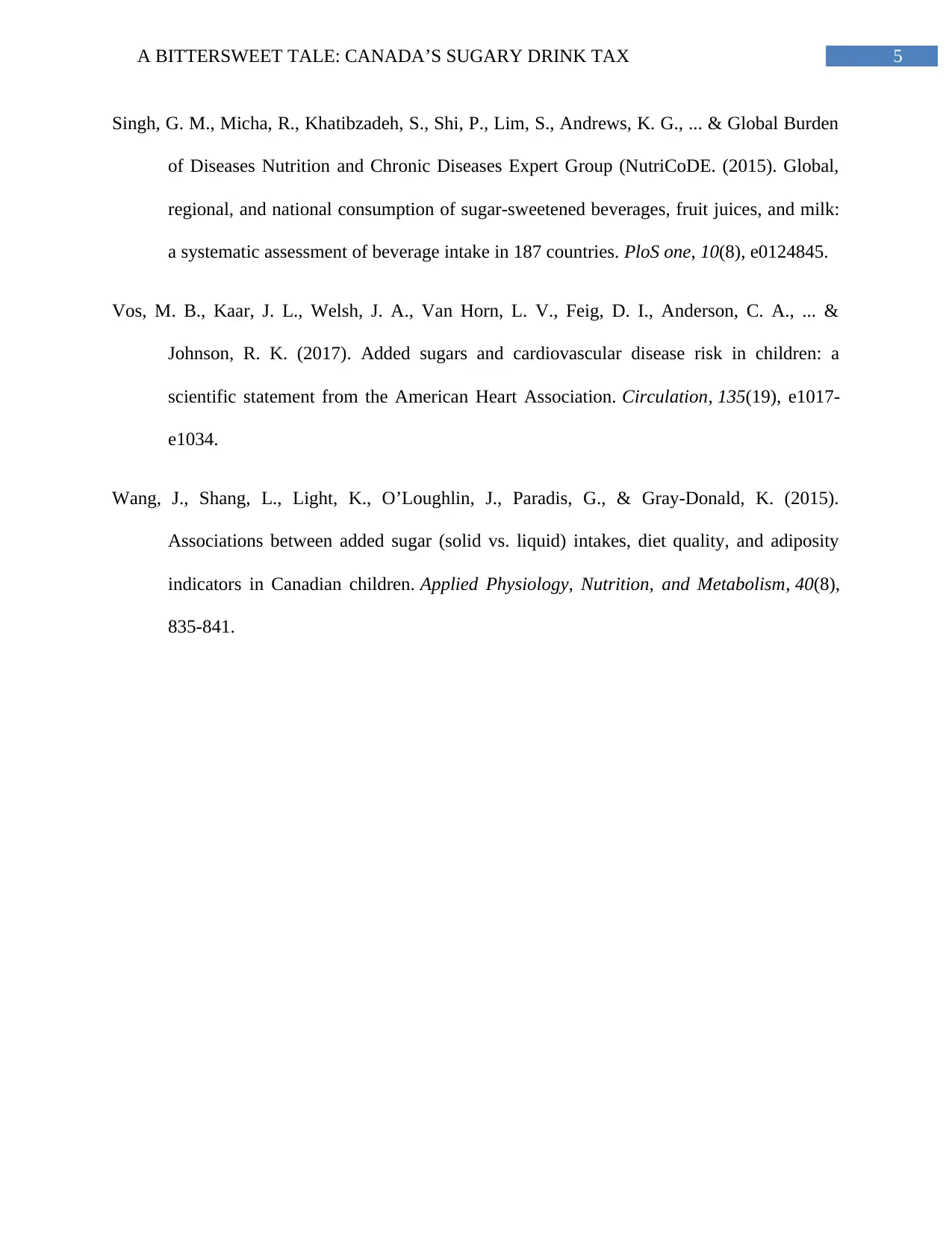
5A BITTERSWEET TALE: CANADA’S SUGARY DRINK TAX
Singh, G. M., Micha, R., Khatibzadeh, S., Shi, P., Lim, S., Andrews, K. G., ... & Global Burden
of Diseases Nutrition and Chronic Diseases Expert Group (NutriCoDE. (2015). Global,
regional, and national consumption of sugar-sweetened beverages, fruit juices, and milk:
a systematic assessment of beverage intake in 187 countries. PloS one, 10(8), e0124845.
Vos, M. B., Kaar, J. L., Welsh, J. A., Van Horn, L. V., Feig, D. I., Anderson, C. A., ... &
Johnson, R. K. (2017). Added sugars and cardiovascular disease risk in children: a
scientific statement from the American Heart Association. Circulation, 135(19), e1017-
e1034.
Wang, J., Shang, L., Light, K., O’Loughlin, J., Paradis, G., & Gray-Donald, K. (2015).
Associations between added sugar (solid vs. liquid) intakes, diet quality, and adiposity
indicators in Canadian children. Applied Physiology, Nutrition, and Metabolism, 40(8),
835-841.
Singh, G. M., Micha, R., Khatibzadeh, S., Shi, P., Lim, S., Andrews, K. G., ... & Global Burden
of Diseases Nutrition and Chronic Diseases Expert Group (NutriCoDE. (2015). Global,
regional, and national consumption of sugar-sweetened beverages, fruit juices, and milk:
a systematic assessment of beverage intake in 187 countries. PloS one, 10(8), e0124845.
Vos, M. B., Kaar, J. L., Welsh, J. A., Van Horn, L. V., Feig, D. I., Anderson, C. A., ... &
Johnson, R. K. (2017). Added sugars and cardiovascular disease risk in children: a
scientific statement from the American Heart Association. Circulation, 135(19), e1017-
e1034.
Wang, J., Shang, L., Light, K., O’Loughlin, J., Paradis, G., & Gray-Donald, K. (2015).
Associations between added sugar (solid vs. liquid) intakes, diet quality, and adiposity
indicators in Canadian children. Applied Physiology, Nutrition, and Metabolism, 40(8),
835-841.
1 out of 6
Related Documents
Your All-in-One AI-Powered Toolkit for Academic Success.
+13062052269
info@desklib.com
Available 24*7 on WhatsApp / Email
![[object Object]](/_next/static/media/star-bottom.7253800d.svg)
Unlock your academic potential
© 2024 | Zucol Services PVT LTD | All rights reserved.





